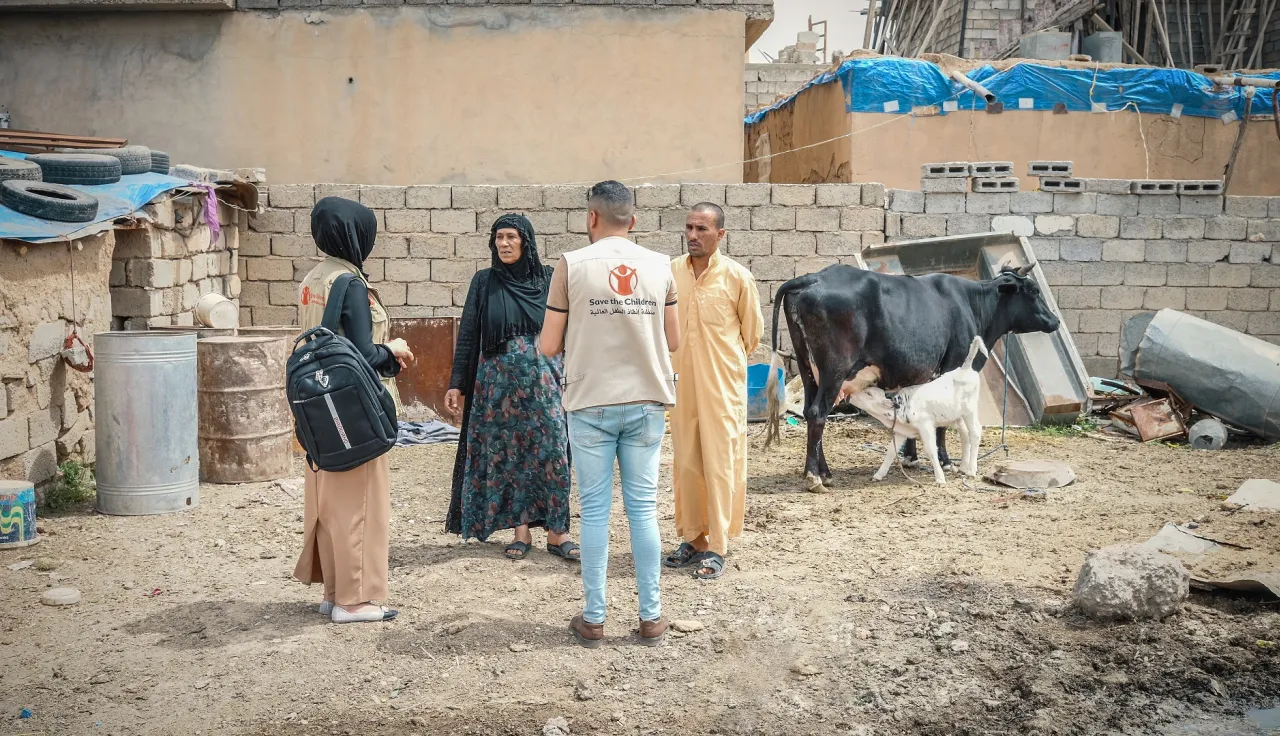Partnering with local organizations makes us stronger

Interview with Jeannette Lundberg, the Partnership and Localization Adviser to "Save the Children"
The scale of the challenges in the Middle East ravaged by conflict, socio-economic unrest, and most recently, COVID-19, led to the ICRC developing partnerships with a variety of actors in a bid to provide a comprehensive humanitarian response to affected people. On top of our long-standing strategic partnership with the Red Cross and Red Crescent Movement partners, we work closely with a number of other actors on a variety of topics, whilst preserving our principled approach.
We talk to Jeannette Lundberg, Save the Children's Partnership and Localization Adviser, about partnerships with local actors in the Middle East. Lundberg introduces the recently published report Turning the Tables which discusses four locally-led partnership models in conflict settings in Syria, Myanmar, and Uganda, to which the ICRC contributed, in particular on the question of complementarity. In addition to localization, the report examines, among others, the questions of racism in the humanitarian sector, the inclusion of marginalized groups, trust, transfer of risk, and responsible partnering in humanitarian response.
In your capacity as the Partnership and Localization Adviser to "Save the Children", can you tell us a bit about your work and the extent of your interactions with the International Committee of the Red Cross (ICRC)?
Cooperating with local actors and, where requested, supporting them to access opportunities for capacity-strengthening and appropriate financing is one of the important principles of Save the Children’s global response plan to COVID-19.
Save the Children’s mandate to promote and defend children’s rights, and to respond to their humanitarian needs and communities is dependent on cooperation with local agencies and aid workers. Today, we have nearly 1,000 partners around the world. With the localization agenda and the commitments to Grand Bargain, we want to contribute in a way that recognizes the local actors’ already existing crisis response and strengthens their natural role in the humanitarian system.
As a member of our global Localization Task Team, I contribute to research, engage in interagency cooperation (for instance with the IFRC) and joint advocacy interventions as well as supporting local actors’ capacity development at country level.
Our latest report, ‘Turning the Tables’, focuses on partnerships in conflict settings. Besides some examples of successful partnership models, the report discusses challenges such as the mistrust of international agencies in local actors’ overall capacity and adherence to humanitarian principles. The ICRC contributed with valuable insights to that report, especially on the importance of complementarity.
Over recent years, both "Save the Children" and the ICRC have focused on strengthening local resilience through supporting national and local partners in different aspects of humanitarian work in the turbulent Middle East. With the added challenge of COVID-19, how do you see the complementarity of both organizations on the ground?
The ICRC and "Save the Children" are both supporting local actors’ capacity in the field of protection and institutional development to foster sustainable structures on the ground. As a former Red Cross employee, I am aware that we are working in different structures of local/national actors, which is where we can complement each other.
Both the ICRC and Save the Children have great opportunities to ensure that the already existing capacity of local actors and their contributions to crisis response are visible and recognized, and to further support them based on their expressed capacity needs. Of specific concern are the overall space and access for local actors to operate, given the security risks, counterterrorism clauses, and lately, new restrictions during the pandemic.
It is also clear that we need to do more to ensure our local partners are supported with funding to cover organizational costs so that work can continue beyond the projects. As international actors, we have to stand up for local humanitarians, use our position to facilitate their access to important forums, as well as promote and protect civic space.
The impact of COVID-19 has further exacerbated the already challenging access to health for different population groups across the Middle East. In addition, people affected by COVID-19 and their families, as well as first responders and humanitarians in general, have been subjected to stigmatization. How has "Save the Children" dealt with stigmatization caused by COVID-19?
I believe that stigmatization is a consequence of a natural and understandable fear among us. It is unfortunate that it hits those who are already in vulnerable situations or those who are trying to contribute. Save the Children is working with local actors to raise awareness among communities, as also among children whom we support to carry out their own campaigns. It is interesting to see that children themselves often bring up different kinds of discrimination. They are very aware of social exclusion and report that some of them are left behind.
Stigmatization is yet another argument for working with a diversity of local actors that are carefully selected. This ensures community acceptance and the ability to contextualize the interaction. This is also one of the key learnings that research taught us about the Ebola crisis in Africa.
Given the fact that local actors might need additional and flexible support during these times, it is important that we develop an open dialogue with our partners on the challenges they are facing and discuss how to work to ensure their safety while providing services to children. We support their continuity plans and share information and resources. It is also important to jointly plan our interventions based on risk analysis. One of the main lessons learned from our partnerships in the region is that we are successful when we ‘stand by’ our partners.
As told to Aleksandra Matijevic Mosimann
NAME Regional Communications Adviser



